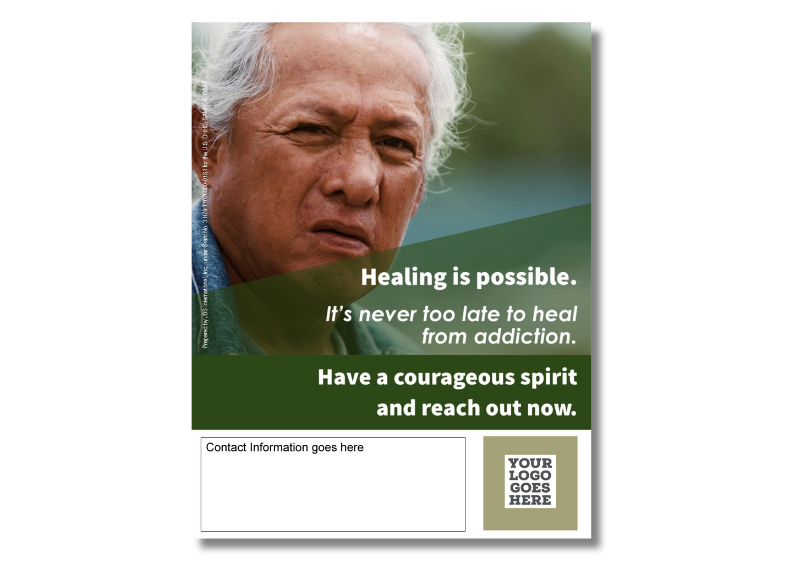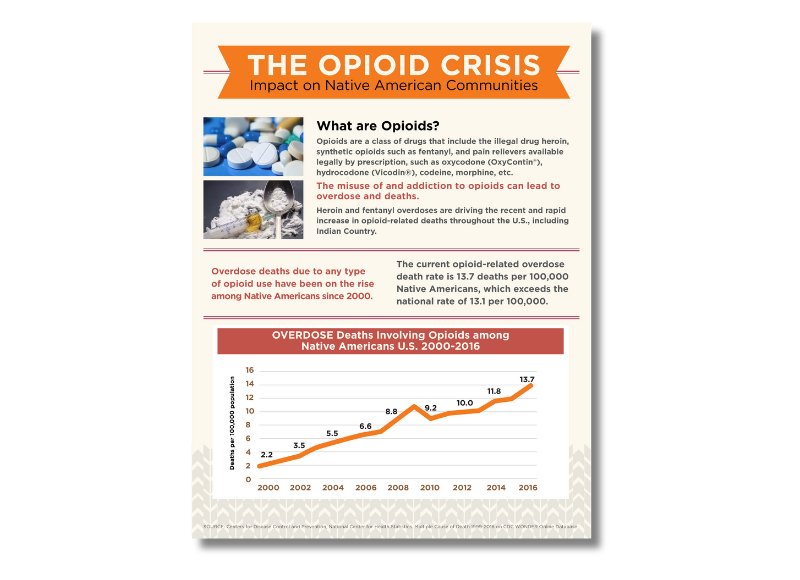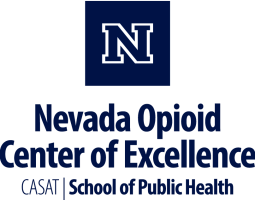
Native American communities have been disproportionately affected by the opioid epidemic, facing higher rates of addiction, overdose deaths, and other related issues compared to the general population. Tribal opioid response strategies may include a combination of prevention, treatment, and recovery programs tailored to the specific cultural, social, and economic contexts of each tribe. These efforts often involve collaboration with tribal governments, health services, community organizations, and other stakeholders to develop comprehensive approaches to address opioid misuse and its consequences.
Tribal Opioid Response Resources
Websites
Native Overdose Prevention Hub
The Native Overdose Prevention Hub is intended to provide Indigenous communities and organizations with culturally inclusive and tailored resources regarding Overdose Prevention. This resource includes toolkits, training materials, data dashboards, and community-led strategies to support prevention and healing.
SAMHSA Tribal Training and Technical Assistance Center (TTTAC)
Provides T/TA for federally recognized tribes and tribal organizations, SAMHSA tribal grantees, and selected American Indian/Alaska Native (AIAN) communities and tribes to develop and implement a Tribal Action Plan. Helps AIAN communities build local capacity around substance use disorders, suicide prevention, and mental health using a culturally relevant, evidence-based, holistic approach.
Native Connections Training and Technical Assistance
Provides T/TA to Native Connections grantees related to the work of the grant, and focuses on the prevention of substance use and misuse, prevention of suicide, the promotion of mental health, and the development and implementation of Strategic Action Plans.
United Natives – Free Mental Health Services for Native Relatives
United Natives, in partnership with L’Oréal USA, is offering free mental health services to Native relatives across selected states, including Nevada. Through this program, participants will receive two comprehensive mental health assessments and ten free counseling sessions with a professionally licensed therapist in their state. All services are offered via telehealth, ensuring accessibility and convenience for those who need support. If you or someone you know could benefit from the services, please reach out to therapy@unitednatives.org or 602-799-8187.
National American Indian & Alaska Native PTTC
The National American Indian & Alaska Native Prevention Technology Transfer Center (NAIAN-PTTC) aims to provide training and technical assistance services to the substance abuse prevention field including professionals, para-professionals, organizations and others in the prevention community focused on American Indian and Alaska Native (AI/AN) communities.
National American Indian and Alaska Native ATTC
The National American Indian and Alaska Native ATTC is a National Center that provides education and training opportunities for individuals and groups involved in providing substance abuse treatment and counseling, including health professionals in primary prevention and treatment for substance abuse. The National American Indian and Alaska Native ATTC is housed in the University of Iowa College of Public Health, but offer services nationwide for consulting, technical assistance, and continuing education seminars. The National American Indian and Alaska Native ATTC focused specifically on the American Indian and Alaska Native (AI & AN) communities.
Tools & Resources
Native Overdose Prevention Hub
The Native Overdose Prevention Hub is intended to provide Indigenous communities and organizations with culturally inclusive and tailored resources regarding Overdose Prevention. This resource includes toolkits, training materials, data dashboards, and community-led strategies to support prevention and healing.
Las Vegas Indian Center
Nevada Urban Indians
Nevada Urban Indians, Inc. is a 501(c)(3) nonprofit organization that is funded by various federal, state, and private grants to provide healthcare & community services to the urban Indian population of Nevada.
Inter-Tribal Council of Nevada, Inc. (ITCN)
The Inter-Tribal Council of Nevada, Inc. (ITCN), is a 501 c 3 non-profit organization that provides services and assistance to families, children and elders living throughout the state of Nevada.
United Natives – Free Mental Health Services for Native Relatives
United Natives, in partnership with L’Oréal USA, is offering free mental health services to Native relatives across selected states, including Nevada. Through this program, participants will receive two comprehensive mental health assessments and ten free counseling sessions with a professionally licensed therapist in their state. All services are offered via telehealth, ensuring accessibility and convenience for those who need support. If you or someone you know could benefit from the services, please reach out to therapy@unitednatives.org or 602-799-8187.
Healing Tool: Guide for addressing behavioral health goals in Native communities
This resource is designed to provide important talking points to use when meeting with or talking to tribal leaders, elders, community members, multi-disciplinary task force members, or local county workers about substance use disorders (SUD), medication assisted treatment (MAT), and other behavioral health issues.
Tribal Opioid Response Resource Toolkit
There has been a lot of attention and funding provided to the national opioid epidemic within recent years, especially the devastating impact it can have in Tribal communities. The collective intent of these funding opportunities is to reduce opioid related deaths in Tribal communities by implementing activities such as strategic plans, prevention and education medication assisted therapy, different forms of treatment, workforce development activities, community recovery support, and so forth. This Tribal Opioid Response Resource Toolkit provides an array of materials, tools, resources and links to support Tribes as they are working to combat the epidemic within their communities.
SPARK Resource Center
The SAMHSA Program to Advance Recovery Knowledge (SPARK) supports transformational, recovery-oriented change for every state, tribal, and territorial behavioral health system and promotes equitable access to recovery supports in the United States. This resource center includes current information focused on equitable recovery supports including recovery-oriented care, recovery supports and services, and recovery-oriented systems for people with mental health/substance use disorders and co-occurring disorders. If you have questions about these resources or suggestions for recovery resources to be added, please email the SPARK team.
Native Harm Reduction Toolkit
This toolkit is a culturally responsive resource designed to help Native communities implement harm reduction strategies, decolonize public health approaches, reduce stigma, and engage Tribal leaders in supporting life-saving interventions.
Publications
SAMHSA Report: Substance Use and Mental Health Issues among US-Born American Indians or Alaska Natives Residing on and off Tribal Lands
About 22 percent of American Indians/Alaska Natives (AI/ANs) reside on reservations or other trust lands, which contain unique governments, histories, traditions,
communities, languages, and behavioral health challenges. In general, there is a lack of nationally representative data on the substance use and mental health of AI/ANs residing on and off tribal lands. This report provides methodological information on how to obtain estimates of behavioral health outcomes for populations living on and off tribal lands and provides some initial estimates.
‘To Walk in the Beauty Way’: Treating Opioid Use Disorder in Native Communities
Research explores the integration of medication-based treatment with the healing traditions of American Indian and Alaska Native communities.
Posters & Infographics

Community Outreach Posters for your Behavioral Health Program
This series of posters, developed by the National American Indian and Alaska Native ATTC, is designed to help you promote awareness of your programs and services in your community! They can be customized by adding your logo, information, and adding a translation of the message in your own language.
View the Resource

The Opioid Crisis: Impact on Native American Communities
This factsheet from the ATTC Network details the the impact of the opioid crisis on Native American communities.
Download the Factsheet
Webinars & Online Learning
Current News & Research
Native and Strong Lifeline: The Nation’s First 988 Crisis Line for Indigenous People
The Native and Strong Lifeline (NSLL) is the nation’s first 988 crisis line designed by and for Indigenous people in Washington state. Operated by the Volunteers of America Western Washington (VOAWW), NSLL has received over 4,150 calls since its launch in November 2022.
NIH launches program to advance research led by Native American communities on substance use and pain
The National Institutes of Health (NIH) has launched a program that will support Native American communities to lead public health research to address overdose, substance use, and pain, including related factors such as mental health and wellness.
Tribal leaders ask Congress for help with fentanyl crisis in Native American communities
Figueroa, A. (2023, November 8). Tribal leaders ask Congress for help with fentanyl crisis in Native American communities. Oregon Capital Chronicle. https://www.oregoncapitalchronicle.com/tribal-leaders-ask-congress-for-help-with-fentanyl-crisis-in-native-american-communities/
